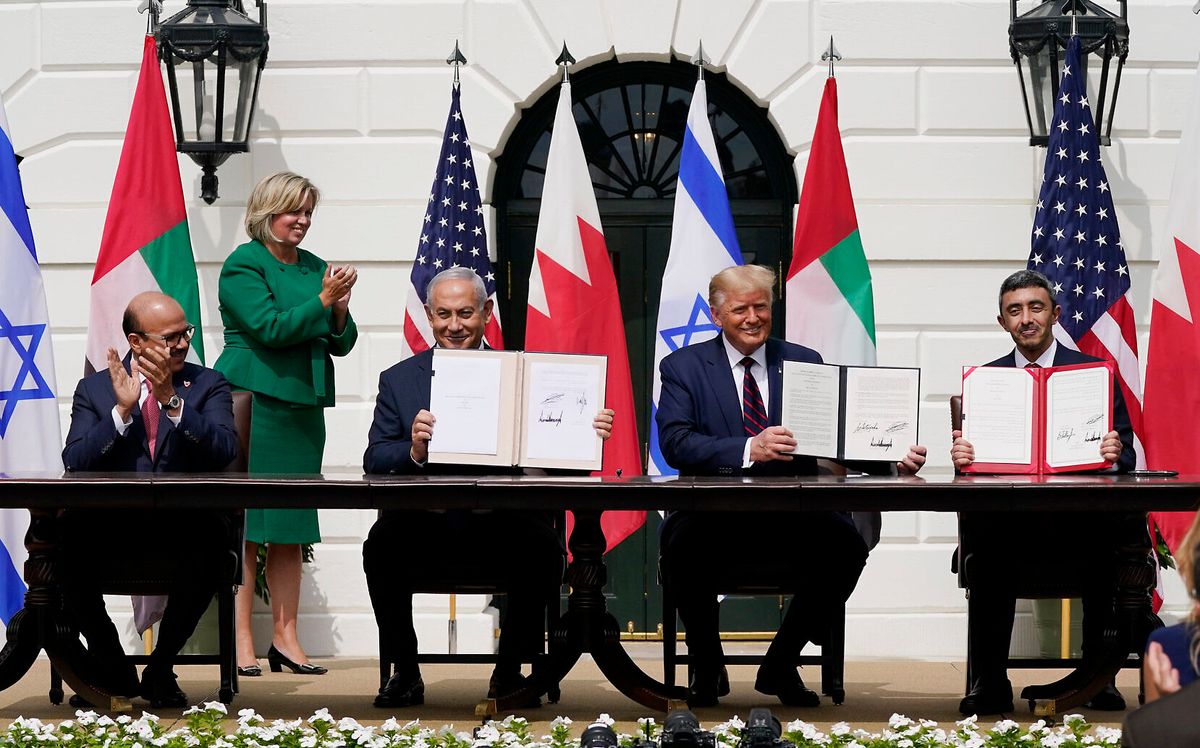What you should know about the Abraham Accords between Israel, the UAE and Bahrain

A few minutes every morning is all you need.
Stay up to date on the world's Headlines and Human Stories. It's fun, it's factual, it's fluff-free.
While acknowledging the value of the normalization of relationships between Arab nations and Israel, experts warn that the accords do not secure peace in the Middle East.
On Tuesday, September 15, the leaders of Israel, the United Arab Emirates and Bahrain met at the White House with United States President Donald Trump to sign the Abraham Accords. The accords have been hailed as a landmark peace treaty in the Middle East, with the Trump administration receiving credit for helping to shepherd the negotiations.
Others have pushed back on the framing of the accords as a peace treaty, noting that Israel was never in conflict with either the UAE or Bahrain.
While acknowledging the value of the normalization of relationships between Arab nations and Israel, experts warn that the accords do not secure peace in the Middle East. Even as the accords were being signed, the violent conflict between Israel and Palestine has continued unabated.
What are the Abraham Accords?
The Abraham Accords Peace Agreement between Israel and the UAE was first announced by Trump on August 13. He heralded the accord as a path toward peace in the Middle East and stated that he hoped “more Arab and Muslim countries will follow the United Arab Emirates’ lead.” By the time of the signing on Tuesday, the island kingdom of Bahrain had joined the accord.
The initial accord between Israel and the UAE is subtitled, “Treaty of Peace, Diplomatic Relations and Full Normalization Between the United Arab Emirates and the State of Israel.”
The accord states the two countries will “work to advance the cause of peace, stability and prosperity throughout the Middle East” while working with “the United States to develop and launch a ‘Strategic Agenda for the Middle East’ in order to expand regional diplomatic, trade, stability and other cooperation.”
The accord further stipulates the two countries will collaborate to advance financial, scientific and environmental development. Among the long-term goals is the establishment of an international air corridor between the countries, greater reciprocal tourism, and the mutual “exploration and use of outer space for peaceful purposes.”
The accord between Israel and Bahrain, subtitled “Declaration of Peace, Cooperation, and Constructive Diplomatic and Friendly Relations,” reiterates the goal of peace and security for all nations in the Middle East. It also emphasizes that the long-term objective is an “enduring solution to the Israeli-Palestinian conflict.”
The broader goal of peace in the Middle East is exemplified in the accord’s name. Abraham is the common ancestor of all three major monotheistic religions in the region, Islam, Judaism and Christianity.
The words of the leaders
The signing of the accords at the White House brought together the four nation’s leaders: US President Donald Trump, Israel Prime Minister Benjamin Netanyahu, the UAE Foreign Minister Abdullah bin Zayed and Bahrain Foreign Minister Abdullatif Al Zayani.
In their remarks at the ceremony, all four leaders spoke of the importance of the accords for the long-term goal of peace in the Middle East. The three leaders of the Middle Eastern nations were effusive in their praise of Trump and his team of negotiators.
Speaking first, Trump said of the accords, “These agreements will serve as the foundation for a comprehensive peace across the entire region … one founded on shared interests, mutual respect, and friendship.”
Netanyahu called the day “a pivot of history” and said the signing “heralds a new dawn of peace.” The UAE’s Bin Zayed echoed the sentiment, stating, “Today … we are already witnessing a change in the heart of the Middle East, a change that will send hope around the world.”
Bahrain’s Al Zayani added, “Today’s agreement is an important first step, and it is now incumbent on us to work urgently and actively to bring about the lasting peace and security our peoples deserve. A just, comprehensive, and enduring two-state solution to the Palestinian-Israeli conflict will be the foundation, the bedrock of such peace.”
Responses to the Abraham Accords
On Tuesday, US Senator Lindsey Graham deemed the signing “a great day for peace” in a video he tweeted. The South Carolina Republican called the accords “peace agreements” and congratulated Trump and his administration on achieving the goal.
While the Abraham Accords are the first formal agreements between Israel and Arab nations since a 1994 accord with Jordan, for some Middle East experts, Tuesday was less than it appeared.
Speaking to The New York Times, Dennis B. Ross, a former US diplomat who helped negotiate the Jordan peace accord under President Bill Clinton, expressed mixed feelings. While acknowledging the accords had significance, he downplayed their effects.
“The UAE and Bahrain are countries not in a state of war with Israel.”
Others contended that although the normalization of relationships between Israel and Arab nations is important, it does not address the core of the Middle East conflict: Israel and Palestine.
Peace in the Middle East?
As reported by The Guardian, as part of the accord, “Netanyahu agreed only to ‘suspend’ but not fully abandon his ambitions to annex the occupied West Bank.” For Palestinians, who were not part of the accord, these agreements are nothing but a stopgap they do not expect to last.
Even as he signed the accords, Netanyahu said on Tuesday he remains committed to military force, saying, “Ultimately, strength brings peace.”
The Trump administration has attempted but failed to negotiate a peace accord between Israel and Palestine. The most recent negotiations were led by Trump’s son-in-law, Jared Kushner. In January 2020, the administration released its peace plan, but it was immediately rejected by the Palestinians, who were said to have had little to no input in the plan.
The West Bank is a region of land on the Jordan River that has been a historical point of conflict between Israel and Palestine. Since 1967, Israel has occupied the land with the goal of annexing it. However, three million Palestinians live in the region as compared to roughly 300,000 Israeli Jews.
On the same day the four nations’ leaders were unveiling the accords, military conflict was still raging in Israel and Palestine. Rockets were launched into Israel by Palestinian militants on September 15. By early the following morning, Israel had retaliated with 10 airstrikes aimed at a Hamas training base and a weapons manufacturing plant. Hamas is a fundamentalist Islamic militant group within Palestine.
Neither side reported causalities from the strikes, but the ongoing show of power between the two underlines how far the region is from having lasting peace.
Trump’s Nobel Peace Prize nomination
In early September, Trump received a nomination for the Nobel Peace Prize for his role in helping oversee the Abraham Accords.
Trump was nominated by Christian Tybring-Gjedde, a member of Norway’s Progress Party, a far-right political party, which has been described as being anti-immigrant and anti-Islam. Tybring-Gjedde also nominated Trump for the prize in 2018 in recognition of his efforts to bring reconciliation between North and South Korea. Trump did not win in 2018.
Any nominations from a national head of state or nationwide politician are accepted. Nominations are also sought from members of the Norwegian Nobel Committee, past Nobel Laureates, university professors and directors of foreign policy institutes.
The winner of the prize will not be announced until October 2021. If Trump were to win, he would follow four other American presidents in receiving the prize: Theodore Roosevelt, Woodrow Wilson, Jimmy Carter and Barack Obama, who received his in the first year of his presidency.
Have a tip or story? Get in touch with our reporters at tips@themilsource.com




Comments ()